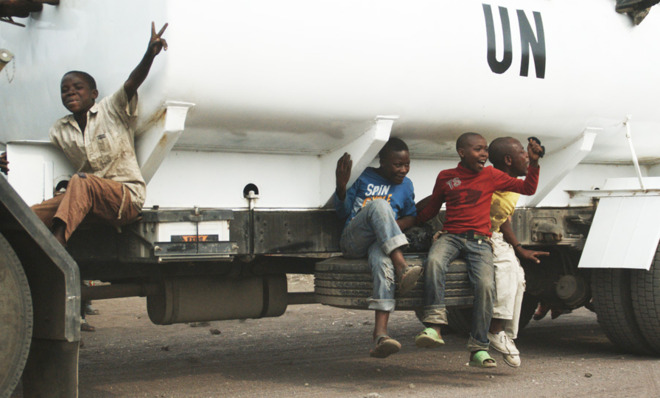Did the U.N. just win its first real war?
The leader of Congo's brutal M23 rebel group has surrendered

Congolese rebel leader Colonel Sultani Makenga has handed himself over to the Ugandan military in Mgahinga National Park, a forested area near the Democratic Republic of Congo border. With that, he brings to an end the U.N.'s first ever "offensive" combat mission.
Question is, was it a success?
The background
The Week
Escape your echo chamber. Get the facts behind the news, plus analysis from multiple perspectives.

Sign up for The Week's Free Newsletters
From our morning news briefing to a weekly Good News Newsletter, get the best of The Week delivered directly to your inbox.
From our morning news briefing to a weekly Good News Newsletter, get the best of The Week delivered directly to your inbox.
In March, the U.N. committed an "intervention brigade" of around 3,000 troops to help the DRC government suppress a brutal 20-month insurgency by Makenga and his M23 rebels. The group — made up mostly of ethnic Tutsis — has wrought havoc across the country. Soldiers on both sides of the conflict have been accused of committing atrocities, including mass murders, rape, and the use of child soldiers. Meanwhile, Uganda and Rwanda have also been drawn into the conflict: Both are accused by the DRC of supporting the rebels.
The U.N.'s intervention was significant because it was the first time in the organization's history that it opted to go on the attack, thereby putting U.N. officials in direct control of soldiers on the ground, of military tactics, and of potential air strikes. The organization's first real war represented a big gamble. As Sudarsan Raghavan notes in The Washington Post, by abandoning its usual policy of neutrality and instead openly allying itself with the Congolese government, the U.N. may have jeopardized its position as a neutral mediator in any future peace process.
What happened this week?
Two days ago, as M23 fighters were driven from their last remaining strongholds, the group announced it was ending its rebellion. With today's announcement, it looks like the war is officially over.
A free daily email with the biggest news stories of the day – and the best features from TheWeek.com
Where's Makenga now?
He's being held, along with 1,700 of his soldiers, in a secret location in Uganda.
What next?
This is where it gets tricky. Will Uganda hand Makenga over? The rebel leader is wanted for war crimes, and is also under U.N. sanctions. However, the Ugandan government has apparently said it won't decide whether to hand him over or not until a peace deal is signed — and it's not clear whether Makenga will demand blanket amnesty for himself and other top M23 commanders as part of that peace deal.
Trouble is, both the U.N. and the DRC are adamant that no rebels accused of serious criminal charges will be given amnesty. As former U.S. Senator and current U.S. envoy to the region Russ Feingold said:
The international community and the United States would not support such an agreement. I also believe that the Congolese government would never sign such an agreement this time. [Washington Post]
So has the war ended?
Against the M23, potentially — those arguments over the peace deal could complicate matters. Either way, that doesn't mean that stability will be restored to the DRC or its surrounding region any time soon. Millions of people have died as a result of the endless conflict in eastern Congo in the last two decades. New rebel groups constantly pop up to fight for control over the area's rich natural resources, like its gold and diamonds, and those groups will continue to emerge in the future. As Martyn Davies, chief executive of the Johannesburg-based Frontier Advisory, told Reuters:
Just because you think you've beaten back the M23 rabble rousers in the east, do you really think it can become a stable country? I don't think so. This time next year, you'll be looking at an 'M24'. [Reuters]
Frances Weaver is a senior editor at The Week magazine. Originally from the U.K., she has written for the Daily Telegraph, The Spectator and Standpoint magazine.
-
 Syria’s Kurds: abandoned by their US ally
Syria’s Kurds: abandoned by their US allyTalking Point Ahmed al-Sharaa’s lightning offensive against Syrian Kurdistan belies his promise to respect the country’s ethnic minorities
-
 The ‘mad king’: has Trump finally lost it?
The ‘mad king’: has Trump finally lost it?Talking Point Rambling speeches, wind turbine obsession, and an ‘unhinged’ letter to Norway’s prime minister have caused concern whether the rest of his term is ‘sustainable’
-
 5 highly hypocritical cartoons about the Second Amendment
5 highly hypocritical cartoons about the Second AmendmentCartoons Artists take on Kyle Rittenhouse, the blame game, and more